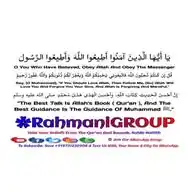
RahmaniGROUP_Official
June 17, 2025 at 06:18 PM
السلام عليكم ورحمة الله وبركاته.
The correct answer is option;
A:Surah Al-Ma'idah ( سورة المائدة )
Congratulations participants 💐
*Reference 👇🏻*
*Surah Al-Ma'idah 5:6*
يَآأَيُّهَا ٱلَّذِينَ ءَامَنُوٓاْ إِذَا قُمۡتُمۡ إِلَى ٱلصَّلَوٰةِ فَٱغۡسِلُواْ وُجُوهَكُمۡ وَأَيۡدِيَكُمۡ إِلَى ٱلۡمَرَافِقِ وَٱمۡسَحُواْ بِرُءُوسِكُمۡ وَأَرۡجُلَكُمۡ إِلَى ٱلۡكَعۡبَيۡنِۚ وَإِن كُنتُمۡ جُنُبࣰا فَٱطَّهَّرُواْۚ وَإِن كُنتُم مَّرۡضَىٰٓ أَوۡ عَلَىٰ سَفَرٍ أَوۡ جَآءَ أَحَدࣱ مِّنكُم مِّنَ ٱلۡغَآئِطِ أَوۡ لَٰمَسۡتُمُ ٱلنِّسَآءَ فَلَمۡ تَجِدُواْ مَآءࣰ فَتَيَمَّمُواْ صَعِيدࣰا طَيِّبࣰا فَٱمۡسَحُواْ بِوُجُوهِكُمۡ وَأَيۡدِيكُم مِّنۡهُۚ مَا يُرِيدُ ٱللَّهُ لِيَجۡعَلَ عَلَيۡكُم مِّنۡ حَرَجࣲ وَلَٰكِن يُرِيدُ لِيُطَهِّرَكُمۡ وَلِيُتِمَّ نِعۡمَتَهُۥ عَلَيۡكُمۡ لَعَلَّكُمۡ تَشۡكُرُونَ
English - Tafsir Jalalayn
O you who believe, when you stand up, that is, when you intend to go, to pray, and you are in [a state of] ritual impurity, wash your faces, and your hands up to the elbows, that is, including them [the elbows], as is clarified in the Sunna; and wipe your heads (the b' in bi-ru'sikum is for `adherence'), that is to say, wipe over [the head] adhering [the hand] closely, without [excessive] water pouring over; the noun [ra's, `head'] is generic, and so the minimum required to fulfil [the stipulation] is acceptable, which is the wiping of some of the hair, as al-Shfi` asserts); and your feet (read wa-arjulakum in the accusative as a supplement to aydyakum; or wa-arjulikum in the genitive because of its adjacency to [the genitive] bi-ru'sikum), up to the ankles, that is, including them [the ankles], as is clarified in the Sunna, and they are the two protruding bones at the juncture of the legs and the feet. The interposing of the wiping of the head between [the mention of] the hands and the feet, which are washed, is intended to show the requirement of [a specific] order during the purification of these limbs, as al-Shfi` asserts. In addition, the requirement of making intention (niyya) in this [ablution], as in the other rituals of worship, is taken from the Sunna. If you are defiled, purify, wash, yourselves; but if you are sick, with an illness made worse by water, or on a journey, travelling, or if any of you comes from the privy, that is, [if] he has defecated, or you have touched women (as mentioned already in the verse in [srat] al-Nis' [Q. 4:43]), and you cannot find water, having made the effort to look for it, then head for, seek, wholesome dust, that is, clean earth, and wipe your faces and your hands, including the elbows, with it, using two strikes (the b' of bi-wujhikum, `your faces', denotes `adherence'; it is explained in the Sunna that the requirement here is for the wiping to encompass the whole of these two parts. God does not desire to make any hardship for you, any constraint, in the obligations He has imposed on you with regard to ablution, washing and purification with dust; but He desires to purify you, of filth and sins, and that He may perfect His grace upon you, through Islam, by explaining the laws of the religion; so that you might give thanks, for His graces.
Urdu - Tafsir Ahsanul Bayaan
اے ایمان والو! جب تم نماز کے لئے اُٹھو تو اپنے منہ کو اور اپنے ہاتھوں کہنیوں سمیت دھو لو (۱)۔ اپنے سروں کو مسح کرو (۲) اور اپنے پاؤں کو ٹخنوں سمیت دھو لو (۳) اور اگر تم جنابت کی حالت میں ہو تو غسل کرلو (٤) ہاں اگر تم بیمار ہو یا سفر کی حالت میں ہو یا تم سے کوئی حاجت ضروری فارغ ہو کر آیا ہو، یا تم عورتوں سے ملے ہو اور تمہیں پانی نہ ملے تو پاک مٹی سے تیمم کر لو، اسے اپنے چہروں پر اور ہاتھوں پر مل لو (۵) اللہ تعالٰی تم پر کسی قسم کی تنگی ڈالنا نہیں چاہتا (٦) بلکہ اس کا ارادہ تمہیں پاک کرنے کا اور تمہیں اپنی بھرپور نعمت دینے کا ہے (۷) تاکہ تم شکر ادا کرتے رہو۔
٦۔١ منہ دھوؤ، یعنی ایک ایک دو دو یا تین تین مرتبہ دونوں ہتھیلیاں دھونے، کلی کرنے، ناک میں پانی ڈال کر جھاڑنے کے بعد۔ جیسا کہ حدیث سے ثابت ہے۔ منہ دھونے کے بعد ہاتھوں کو کہنیوں سمیت دھویا جائے۔
٦۔۲ مسح پورے سر کا کیا جائے۔ جیسا کہ حدیث سے ثابت ہے اپنے ہاتھ آگے سے پیچھے گدی تک لے جائے اور پھر وہاں سے آگے کو لائے جہاں سے شروع کیا تھا۔ اسی کے ساتھ کانوں کا مسح کر لے۔
٦۔۳ارجلکم کا عطف وجوھکم پر ہے یعنی اپنے پیر ٹخنوں تک دھوؤ!
٦ ۔٤جنابت سے مراد وہ ناپاکی ہے جو احتلام یا بیوی سے ہم بستری کرنے کی وجہ سے ہوتی ہے اور اسی حکم میں حیض اور نفاس بھی داخل ہے۔ جب حیض اور نفاس کا خون بند ہو جائے تو پاکیزگی حاصل کرنے کے لئے طہارت یعنی غسل ضروری ہے۔ البتہ پانی نہ ملنے کی صورت میں تیمم کی اجازت ہے جیسا کہ حدیث سے ثابت ہے (فتح القدیر)
٦۔۵ اس کی مختصر تشریح اور تیمم کا طریقہ سورۃ نساء کی آیت نمبر ٢٣ میں گزر چکا ہے۔ صحیح بخاری میں اس کی شان نزول کی بابت آتا ہے کہ ایک سفر میں بیداء کے مقام پر حضرت عائشہ رضی اللہ عنہا کا ہار گم ہوگیا جس کی وجہ سے وہاں پر رکنا یا رہنا پڑا۔ صبح کی نماز کے لئے لوگوں کے پاس پانی نہ تھا اور تلاش ہوئی تو پانی دستیاب بھی نہیں ہوا اس موقع پر یہ آیت نازل ہوئی جس میں تیمم کی اجازت دی گئی ہے۔ حضرت اسید بن حضیر رضی اللہ عنہ نے آیت سن کر کہا اے آل ابی بکر! تمہاری وجہ سے اللہ نے لوگوں کے لئے برکتیں نازل فرمائی ہیں یہ تمہاری کوئی پہلی برکت نہیں ہے۔ (تم لوگوں کے لئے سراپا برکت ہو) (صحیح بخاری)
٦۔٦اس لئے تیمم کی اجازت فرما دی ہے۔
٦۔۷ اسی لئے حدیث میں وضو کرنے کے بعد دعا کرنے کی ترغیب ہے۔ دعاؤں کی کتابوں سے دعا یاد کر لی جائے.
جزاك الله خير..
👍
❤️
3